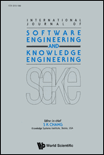
INTERNATIONAL JOURNAL OF SOFTWARE ENGINEERING AND KNOWLEDGE ENGINEERING
Scope & Guideline
Bridging Theory and Practice in Engineering Excellence
Introduction
Aims and Scopes
- Software Defect Prediction and Quality Assurance:
The journal publishes research on methodologies and models for predicting software defects, enhancing software quality through various testing and verification techniques. - Machine Learning Applications in Software Engineering:
There is a strong emphasis on the application of machine learning techniques for various software engineering tasks, including code analysis, defect prediction, and automated testing. - Agile Development Practices and Methodologies:
The journal covers studies related to agile methodologies, their implementation in software projects, and their impact on software quality and team dynamics. - Knowledge Representation and Management:
Research on knowledge engineering, including knowledge representation techniques, knowledge graphs, and their applications in software engineering, is a core focus. - Cybersecurity and Software Vulnerabilities:
The journal addresses issues related to software security, including vulnerability detection, secure coding practices, and the impact of security measures on software development. - Human-Computer Interaction and Usability:
The journal explores the interaction between users and software systems, including studies on usability, user experience, and the development of user-centered design methodologies. - Emerging Technologies in Software Development:
Research on the impact of emerging technologies such as quantum computing, cloud computing, and artificial intelligence on software engineering practices is increasingly prominent.
Trending and Emerging
- Artificial Intelligence and Machine Learning Integration:
There is a significant rise in research that integrates AI and machine learning into software engineering processes, including automated testing, code generation, and defect prediction. - DevOps and Continuous Integration/Continuous Deployment (CI/CD):
Research on DevOps practices, CI/CD pipelines, and their impact on software delivery speed and quality has gained momentum, reflecting the industry's shift towards agile and collaborative development practices. - Quantum Software Engineering:
Emerging interest in quantum software engineering showcases the journal's commitment to exploring cutting-edge technologies and their implications for software development. - Software Engineering for IoT and Edge Computing:
The increasing prevalence of IoT devices and edge computing has led to a surge in research focused on software engineering challenges specific to these domains, including security, scalability, and interoperability. - User-Centered Design and Experience Engineering:
There is a growing trend towards research that emphasizes user-centered design principles and methodologies to enhance user experience in software applications. - Cross-Disciplinary Approaches in Software Engineering:
The journal is seeing a rise in interdisciplinary research that combines insights from fields such as data science, social computing, and cognitive science with software engineering practices.
Declining or Waning
- Traditional Software Development Methodologies:
There has been a noticeable decline in publications focused on traditional software development methodologies, such as waterfall and V-model approaches, as agile and iterative methodologies gain more traction. - Basic Software Testing Techniques:
Research centered on basic or manual software testing techniques appears to be waning, with a shift towards more advanced automated testing and machine learning-based approaches. - Static Code Analysis:
While still important, the volume of research on static code analysis has decreased as more researchers focus on dynamic analysis and runtime verification techniques. - Legacy Systems Maintenance:
Studies specifically addressing the maintenance of legacy systems have decreased, likely due to a growing emphasis on modern software architectures and cloud-based solutions. - Single-Platform Development:
The focus on single-platform development practices is declining as research increasingly emphasizes cross-platform and multi-device solutions, reflecting the industry's shift towards a more interconnected software ecosystem.
Similar Journals
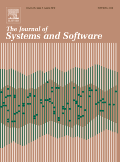
JOURNAL OF SYSTEMS AND SOFTWARE
Elevating Academic Discourse in Computer Science.JOURNAL OF SYSTEMS AND SOFTWARE, published by Elsevier Science Inc, is a premier academic journal that serves as a vital platform for the dissemination of cutting-edge research in the fields of software engineering, information systems, and hardware architecture. With an impressive impact factor and consistently ranking in the Q1 category across several relevant sectors, including hardware and architecture (ranked 33rd out of 177), information systems (ranked 72nd out of 394), and software (ranked 75th out of 407) as of 2023, this journal is recognized for its rigorous peer-review process and high-quality publications. Established in 1979, the journal has become an essential resource for researchers, professionals, and students looking to stay abreast of the latest advancements and emerging trends in systems and software. While the journal does not currently operate under an open-access model, it ensures wide visibility through its indexed publications and is dedicated to advancing scholarly discourse in computer science. With contributions from leading experts in the field, JOURNAL OF SYSTEMS AND SOFTWARE continues to shape the landscape of software and systems research.

PROGRAMMING AND COMPUTER SOFTWARE
Exploring the Frontiers of Software Engineering ExcellencePROGRAMMING AND COMPUTER SOFTWARE is a distinguished journal committed to advancing the field of software development and programming methodologies. Published by PLEIADES PUBLISHING INC, this journal has been a valuable resource since its inception in 1978, reaching out to researchers, professionals, and students alike. With an emphasis on rigorous peer-reviewed articles, the journal holds a Q3 ranking in the realm of Software according to the latest 2023 Category Quartiles. Though it does not offer open access, the journal ensures that high-quality research is disseminated to its audience, providing insights into evolving programming techniques, software engineering challenges, and innovative solutions. With its convergence of years extending to 2024, PROGRAMMING AND COMPUTER SOFTWARE remains a pivotal publication, fostering a deeper understanding of the complexities in computer programming while supporting the broader software community.
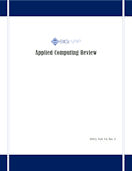
Applied Computing Review
Navigating the Intersection of Theory and ApplicationApplied Computing Review is a prominent academic journal published by the Association for Computing Machinery (ACM), an esteemed organization known for advancing the computing profession. Focusing on the intersection of practical applications and theoretical foundations, this journal serves as a vital platform for disseminating research in the field of applied computing, facilitating knowledge sharing among researchers, professionals, and students alike. With an ISSN of 1559-6915, the journal encompasses a wide array of topics including software engineering, data analytics, and application development, addressing current trends and challenges in the industry. Although it does not offer open access, its rigorous peer-review process ensures high-quality publications that significantly contribute to the discipline. Positioned within a competitive landscape, Applied Computing Review is dedicated to fostering innovation and providing insightful perspectives that inspire further research, thereby solidifying its importance in the field of applied computing.

Innovations in Systems and Software Engineering
Fostering Innovation in Systems DevelopmentInnovations in Systems and Software Engineering, published by Springer London Ltd, is a highly relevant journal dedicated to advancing the field of software engineering and systems innovation. With an ISSN of 1614-5046 and E-ISSN 1614-5054, this journal serves as a key platform for researchers and practitioners to share their insights, cutting-edge research, and developments from 2005 to 2024. Positioned in the Q3 category for software within the 2023 metrics and ranked #219 out of 407 in Scopus, the journal highlights its commitment to addressing the evolving challenges and opportunities in software systems. Although not open access, it maintains a rigorous peer-review process to ensure the dissemination of quality research. As the field continues to grow in complexity, Innovations in Systems and Software Engineering is vital for fostering collaboration and innovation among professionals, students, and researchers aiming to shape the future of software engineering.

Journal of Advances in Information Technology
Unlocking the Potential of Information TechnologyJournal of Advances in Information Technology, published by ENGINEERING & TECHNOLOGY PUBLISHING, is an essential platform for researchers, professionals, and students invested in the dynamic fields of information technology, artificial intelligence, and computer science. With its ISNN of 1798-2340, this journal provides a rigorous peer-reviewed environment that supports the dissemination of innovative research findings, methodologies, and case studies. Since its inception in 2019, it has made notable strides, as reflected in its Q3 quartile rankings across various categories, including Artificial Intelligence and Software, and maintains respectable Scopus rankings, further solidifying its position as a key player in the academic community. Featuring a diverse range of topics within its scope, the journal encourages open access to knowledge while serving as a beacon for those seeking to expand their understanding of current trends and technologies shaping the future. Join us in advancing the field with impactful research that is both relevant and cutting-edge.

e-Informatica Software Engineering Journal
Empowering innovation with high-quality software engineering studies.e-Informatica Software Engineering Journal, published by WROCLAW UNIVERSITY OF TECHNOLOGY, FACULTY OF COMPUTER SCIENCE & MANAGEMENT, is a premier open access journal dedicated to disseminating high-quality research in the field of software engineering. Since its inception in 2007, this journal has played a vital role in advancing knowledge and understanding within the software engineering community. With an ISSN of 1897-7979 and an E-ISSN of 2084-4840, it is recognized for its contributions, achieving a notable Q3 ranking in the Software category for 2023, reflecting its commitment to publish impactful research. The journal covers a wide array of topics that shape the current landscape of software engineering, appealing to researchers, professionals, and students alike. Moreover, it maintains a robust presence in academic databases, ranked #278 out of 407 in Computer Science - Software by Scopus, placing it in the 31st percentile. The journal's commitment to open access ensures that all published articles are freely available to promote wider dissemination and engagement with the scholarly community, paving the way for innovative developments and collaborative research in the field. If you're aiming to contribute to or stay updated with seminal research in software engineering, e-Informatica is your gateway to groundbreaking findings.

Journal of Object Technology
Navigating the Evolving Landscape of Software EngineeringJournal of Object Technology is a premier publication housed under the esteemed JOURNAL OBJECT TECHNOLOGY in Switzerland, dedicated to advancing the field of software engineering and technology. With a history of continuous publication since 2002, this journal serves as a platform for innovative research, critical reviews, and case studies that explore the nuances of object-oriented technologies and their applications in software development. Although currently categorized in the lower quartile (Q4), this journal's focus on relevant and emerging topics remains vital for researchers, professionals, and students alike, seeking to enhance their understanding of contemporary software-related issues. Addressing significant milestones and offering insights into future directions, the Journal of Object Technology plays an essential role in the evolving landscape of computer science, providing open access opportunities that ensure wide dissemination of knowledge. Situated at ETH Zurich, the journal is committed to fostering collaboration and dialogue among researchers worldwide, underscoring its importance within the global scholarly community.
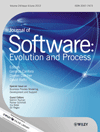
Journal of Software-Evolution and Process
Unveiling Trends in Software EvolutionThe Journal of Software-Evolution and Process, published by WILEY, is a premier academic journal dedicated to advancing knowledge in the field of software evolution and methodologies. With an impact factor that places it in the Q2 quartile of software-related research, this journal is widely recognized for its rigorous peer-reviewed articles that explore the dynamics of software development, maintenance, and transformation. Addressing the challenges faced by software engineers and researchers, the journal seeks to provide innovative insights and solutions, fostering both theoretical understanding and practical applications. Since its inception in 2012, Journal of Software-Evolution and Process has contributed significantly to the academic community, featuring research that is highly relevant to contemporary trends and technologies in the software industry. For those committed to enhancing their expertise, this journal provides an invaluable resource via open access options.
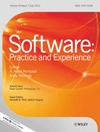
SOFTWARE-PRACTICE & EXPERIENCE
Transforming software experience through high-quality research.SOFTWARE-PRACTICE & EXPERIENCE, published by Wiley, is a prestigious journal that has significantly contributed to the field of software engineering since its inception in 1971. With a Q2 ranking in Software according to the 2023 category quartiles, it stands among the top tier of journals, positioned in the 79th percentile within Scopus’s Computer Science _ Software category. The journal focuses on disseminating high-quality research that reflects both academic rigour and practical application in software-related practices, ensuring that it remains relevant for researchers, professionals, and students alike. Although it does not currently offer Open Access options, it continues to provide invaluable insights and thorough explorations of contemporary issues in software development, methodology, and experience. As it converges toward 2024, SOFTWARE-PRACTICE & EXPERIENCE aims to foster a greater understanding of effective software practices in a rapidly evolving technological landscape.

Journal of Communications Software and Systems
Connecting Theory with Practice in Communications TechnologyThe Journal of Communications Software and Systems, with ISSN 1845-6421 and E-ISSN 1846-6079, is a prominent platform for scholars and practitioners in the field of communications and software engineering, published by the esteemed Croatian Communications & Information Society. Since its establishment in 2006, this Open Access journal, based in Croatia, has committed to disseminating cutting-edge research and innovative solutions that bridge gaps between theory and practical application in the rapidly evolving domain of electrical and electronic engineering. With an impact factor that reflects its relevance, the journal holds significant rankings in both Electrical and Electronic Engineering (Q3) and Software (Q4) categories, according to the 2023 metrics, highlighting its essential role in advancing knowledge in these critical areas. The journal not only serves as a repository of knowledge but also encourages collaborations and discussions among researchers, professionals, and students alike, making it an indispensable resource for anyone looking to stay abreast of the latest developments and research trends from 2006 to 2024 and beyond.